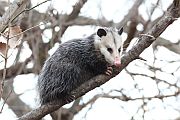- Could Your Grocery Store Meat Be Causing Recurring UTIs?
- Are You Making This Expensive Thermostat Error This Winter?
- Recognizing the Signs of Hypothyroidism
- 10 Strategies to Overcome Insomnia
- Could Artificial Sweeteners Be Aging the Brain Faster?
- Techniques for Soothing Your Nervous System
- Does the Water in Your House Smell Funny? Here’s Why
- Can a Daily Dose of Apple Cider Vinegar Actually Aid Weight Loss?
- 6 Health Beverages That Can Actually Spike Your Blood Sugar
- Treatment Options for Social Anxiety Disorder
Opossums May Come to Humans’ Rescue for Snake Anti-Venom


Wouldn’t it be great if humans were immune to snakes’ venom? Well, opossums are, and scientists are studying the mammals with an eye to creating a new and better venom antidote.
Such an antidote could save thousands of lives worldwide without the side effects caused by current treatments, explained a team led by Claire Komives of San Jose State University.
Opossums suffer no ill effects from snake bite venom, and prior research has found that a certain protein the creatures possess seems to neutralize the venom.
In its study, Komives’ group had the protein chemically synthesized. The researchers found that it protected mice from the venom of U.S. Western Diamondback rattlesnakes, as well as the deadly Russell’s viper from Pakistan. Of course, more research is needed to determine if the anti-venom will work in humans, as well.
The study was to be presented Sunday at the annual meeting of the American Chemical Society in Denver.
“It appears that the venom protein may bind to the [protein], rendering it no longer toxic,” Komives said in a meeting news release.
She and her team found they could program the E. coli bacteria to manufacture the protein, making it inexpensive to produce large amounts. The protein should also be easy to purify from E. coli, the researchers said.
An inexpensive anti-venom could make a huge difference in areas such as Africa, India, Southeast Asia, and South America, where thousands of people are bitten by poisonous snakes each year.
Worldwide, there are about 421,000 poisonous snake bites and 20,000 deaths from those bites each year, according to the International Society on Toxicology.
Findings presented at scientific meetings are typically considered preliminary until published in a peer-reviewed journal.
More information
The U.S. Centers for Disease Control and Prevention has more about venomous snakes.
Source: HealthDay
Copyright © 2026 HealthDay. All rights reserved.










